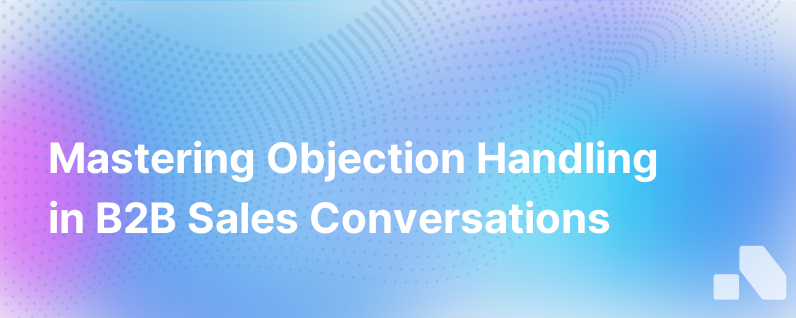
Overcoming objections is an integral skill in the world of high-stakes B2B sales. In these environments, sales conversations are often intricate, with significant revenues and potentially game-changing deals at play. The ability to steer through objections not only requires depth of product knowledge but also a keen understanding of human psychology and the customer's unique business landscape. Let's explore the art and strategy behind mastering objections in B2B sales conversations.
Understanding the Nature of Objections
Objections are a natural part of the sales process. They are not outright rejections but rather signals from potential clients that require further clarification or reassurance. Typical objections include concerns about cost, the readiness to purchase, the quality or efficacy of the product or service, or the need for consensus from a team or higher authority.
The Essentials of Handling Objections
Sales professionals must understand that handling objections effectively often means the difference between closing a deal and losing a potentially lucrative contract. The process involves several steps:
- Active Listening: The foundation for handling any objection is to ensure that the customer feels heard. Active listening involves giving the speaker your undivided attention, acknowledging their concerns, and summarizing their points to confirm understanding.
- Probing with Purpose: After acknowledging the objection, probing questions can clarify the root cause. These should be open-ended questions that help uncover the underlying issues.
- Empathizing Genuinely: Express empathy without dismissing the prospect's concerns prematurely. It is important to validate their feelings and frustrations to build trust.
- Presenting Solutions: Once the objection's nature is fully grasped, the sales rep can tailor a response that directly addresses these concerns with data, anecdotes, and clear logic.
Frameworks for Objection Handling
Several popular frameworks and tactics help systematize the process of overcoming objections:
- Feel, Felt, Found: This method involves expressing understanding of the prospect's concern (feel), assuring them that others have felt the same way (felt), and telling them how these concerns were resolved (found).
- LAER (Listen, Acknowledge, Explore, Respond): This technique encourages active listening, acknowledgment of the objection, exploration of the issues behind the objection, and crafting a response that addresses them.
The Role of Preparation
Preparation is crucial in negotiating objections. A sales team should rehearse possible scenarios and objections they might face in high-stakes conversations. Researching past interactions with similar accounts and identifying patterns in objections can fortify a salesperson’s ability to respond on the fly.
Consistency and Personalization in Responses
Consistent messaging is vital, but personalizing responses to address a prospect’s specific scenario can greatly increase your chances of overcoming objections. A one-size-fits-all response might signal a lack of understanding or investment in the prospect's situation.
Leveraging Data and Social Proof
When dealing with objections about your product or service’s effectiveness or value, data is your ally. Proof-points such as case studies, testimonials, or ROI calculations can be pivotal in swaying opinions and mitigating doubts.
The Importance of Timeliness
Response time can also influence the effectiveness of handling objections. In high-stakes situations, a prompt yet thoughtful resolution to an objection can demonstrate both commitment to service and readiness to support the customer’s business needs.
Training for Excellence
Ongoing training for sales professionals is essential to refine the approaches to objection handling. Role-playing exercises, peer learning, and studying sales calls can hone a sales team's ability to navigate complex negotiations.
Case Studies of Overcoming Objections
Real-world scenarios where sales teams have triumphed over objections offer excellent learning opportunities and motivation. For example, a tech startup facing objections on its pricing strategy realigned its sales narrative to focus on TCO (Total Cost of Ownership) and ROI, successfully overcoming cost-related objections.
Continuous Learning from the Field
Regular feedback sessions and post-mortems from won or lost deals allow sales professionals to adjust their strategies and improve their objection-handling skills continually.
Conclusion
In high-stakes B2B sales, a well-orchestrated approach to overcoming objections can profoundly impact a business’s bottom line. By employing active listening, empathetic understanding, strategic questioning, and personalized solution-offering, B2B sales representatives can turn potential deal-breakers into opportunities to solidify customer relationships and close sales.
As a solution that understands these dynamics, Aomni leverages real-time account research and competitive insights to prepare sales teams sufficiently. By delivering actionable sales content quickly, Aomni supports the strategic efforts necessary for sales teams to tackle high-stakes objections head-on, fostering a sophisticated and knowledgeable sales force capable of maneuvering through the most demanding conversations.
Sources:
- The Top 5 B2B Sales Objections and How to Overcome Them
- Effective objection handling in B2B sales - Pipeful - B2B Lead Generation
- Objection Handling Techniques & Examples to Close More B2B Sales | Walnut
- Train Your Salespeople to Handle Objections Like a Pro
- 4 Steps to Overcoming Sales Objections
- 7 Common B2B Sales Objections & How To Overcome Them – Reply
- Objection Handling: 44 Common Sales Objections & How to Respond
- 20 Examples of Common Sales Objections With Responses (2024)